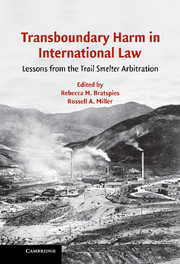Book contents
- Frontmatter
- Contents
- Contributors
- Acknowledgments
- Foreword by David D. Caron
- TRANSBOUNDARY HARM IN INTERNATIONAL LAW
- Introduction
- PART ONE THE TRAIL SMELTER ARBITRATION – HISTORY, LEGACY, AND REVIVAL
- 1 “An Outcrop of Hell”: History, Environment, and the Politics of the Trail Smelter Dispute
- 2 The Trail Smelter Dispute [Abridged]
- 3 Of Paradoxes, Precedents, and Progeny: The Trail Smelter Arbitration 65 Years Later
- 4 Pollution by Analogy: The Trial Smelter Arbitration [Abridged]
- 5 Has International Law Outgrown Trail Smelter?
- 6 The Flawed Trail Smelter Procedure: The Wrong Tribunal, the Wrong Parties, and the Wrong Law
- 7 Rereading Trail Smelter [Abridged]
- 8 Trail Smelter and the International Law Commission's Work on State Responsibility for Internationally Wrongful Acts and State Liability
- 9 Derivative versus Direct Liability as a Basis for State Liability for Transboundary Harms
- 10 Transboundary Pollution, Unilateralism, and the Limits of Extraterritorial Jurisdiction: The Second Trail Smelter Dispute
- PART TWO TRAIL SMELTER AND CONTEMPORARY TRANSBOUNDARY HARM – THE ENVIRONMENT
- PART THREE TRAIL SMELTER AND CONTEMPORARY TRANSBOUNDARY HARM – BEYOND THE ENVIRONMENT
- Annex A Convention Between the United States of America and the Dominion of Canada Relative to the Establishment of a Tribunal to Decide Questions of Indemnity and Future Regime Arising from the Operation of Smelter at Trail, British Columbia
- Annex B Trail Smelter Arbitral Tribunal Decision, April 16, 1938
- Annex C Trail Smelter Arbitral Tribunal March 11, 1941, Decision
- Index
9 - Derivative versus Direct Liability as a Basis for State Liability for Transboundary Harms
Published online by Cambridge University Press: 08 September 2009
- Frontmatter
- Contents
- Contributors
- Acknowledgments
- Foreword by David D. Caron
- TRANSBOUNDARY HARM IN INTERNATIONAL LAW
- Introduction
- PART ONE THE TRAIL SMELTER ARBITRATION – HISTORY, LEGACY, AND REVIVAL
- 1 “An Outcrop of Hell”: History, Environment, and the Politics of the Trail Smelter Dispute
- 2 The Trail Smelter Dispute [Abridged]
- 3 Of Paradoxes, Precedents, and Progeny: The Trail Smelter Arbitration 65 Years Later
- 4 Pollution by Analogy: The Trial Smelter Arbitration [Abridged]
- 5 Has International Law Outgrown Trail Smelter?
- 6 The Flawed Trail Smelter Procedure: The Wrong Tribunal, the Wrong Parties, and the Wrong Law
- 7 Rereading Trail Smelter [Abridged]
- 8 Trail Smelter and the International Law Commission's Work on State Responsibility for Internationally Wrongful Acts and State Liability
- 9 Derivative versus Direct Liability as a Basis for State Liability for Transboundary Harms
- 10 Transboundary Pollution, Unilateralism, and the Limits of Extraterritorial Jurisdiction: The Second Trail Smelter Dispute
- PART TWO TRAIL SMELTER AND CONTEMPORARY TRANSBOUNDARY HARM – THE ENVIRONMENT
- PART THREE TRAIL SMELTER AND CONTEMPORARY TRANSBOUNDARY HARM – BEYOND THE ENVIRONMENT
- Annex A Convention Between the United States of America and the Dominion of Canada Relative to the Establishment of a Tribunal to Decide Questions of Indemnity and Future Regime Arising from the Operation of Smelter at Trail, British Columbia
- Annex B Trail Smelter Arbitral Tribunal Decision, April 16, 1938
- Annex C Trail Smelter Arbitral Tribunal March 11, 1941, Decision
- Index
Summary
INTRODUCTION
The Trail Smelter arbitration has become synonymous with the “polluter pays” principle – the basic vision of environmental liability that infuses both domestic and international law. Under the “polluter pays” principle, the polluter bears the expense of carrying out pollution prevention, control, and remediation measures. It is somewhat ironic that despite frequent characterizations of Trail Smelter as embodying, or even establishing, this principle, Consolidated Mining, the owner and operator of the polluting smelter, was not a party to the arbitration. The arbitration was instead between Canada and the United States, and the Tribunal's award directed Canada, not the smelter, to pay damages for environmental harms suffered in the United States. Given this somewhat paradoxical relationship between the perception of Trail Smelter as creating a “polluter pays” principle and the fact that the polluter was not a party to the arbitration, it is worth exploring the alternative theories of liability that could provide a basis for the Trail Smelter principle.
I am reminded of a story a friend once told me. While on a research expedition in a remote part of the world, one expedition member's camera was stolen. The expedition members contacted the local police. Several police officers went to the nearby village and summoned the villagers. The officers identified the village leader and told the villagers that the leader would be beaten until the camera was returned. The officers proceeded to beat the village leader until eventually the thief returned the camera.
- Type
- Chapter
- Information
- Transboundary Harm in International LawLessons from the Trail Smelter Arbitration, pp. 99 - 108Publisher: Cambridge University PressPrint publication year: 2006



